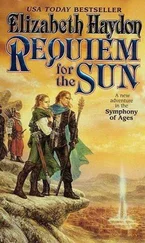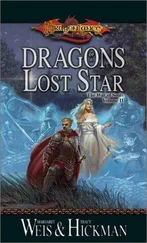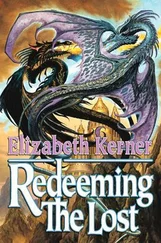Elizabeth Heydon - Elegy for a Lost Star
Здесь есть возможность читать онлайн «Elizabeth Heydon - Elegy for a Lost Star» весь текст электронной книги совершенно бесплатно (целиком полную версию без сокращений). В некоторых случаях можно слушать аудио, скачать через торрент в формате fb2 и присутствует краткое содержание. Год выпуска: 2004, Жанр: Фэнтези, на английском языке. Описание произведения, (предисловие) а так же отзывы посетителей доступны на портале библиотеки ЛибКат.
- Название:Elegy for a Lost Star
- Автор:
- Жанр:
- Год:2004
- ISBN:нет данных
- Рейтинг книги:3 / 5. Голосов: 1
-
Избранное:Добавить в избранное
- Отзывы:
-
Ваша оценка:
- 60
- 1
- 2
- 3
- 4
- 5
Elegy for a Lost Star: краткое содержание, описание и аннотация
Предлагаем к чтению аннотацию, описание, краткое содержание или предисловие (зависит от того, что написал сам автор книги «Elegy for a Lost Star»). Если вы не нашли необходимую информацию о книге — напишите в комментариях, мы постараемся отыскать её.
Elegy for a Lost Star — читать онлайн бесплатно полную книгу (весь текст) целиком
Ниже представлен текст книги, разбитый по страницам. Система сохранения места последней прочитанной страницы, позволяет с удобством читать онлайн бесплатно книгу «Elegy for a Lost Star», без необходимости каждый раз заново искать на чём Вы остановились. Поставьте закладку, и сможете в любой момент перейти на страницу, на которой закончили чтение.
Интервал:
Закладка:
Elegy for a Lost Star
Elizabeth Haydon
For my adopted siblings Daughter of the Earthly Garden Son of the Sea for all they’ve done to keep it going with love
Acknowledgments
Many thanks to three sets of innkeepers whose hospitality was inspirational in the places I visited while researching this book:
The Taste of Alaska Lodge, Fairbanks, Alaska
Quagmire Manor, Homer, New York
King’s Inn, Huntsville, Alabama
Ode
We are the music-makers,
And we are the dreamers of dreams,
Wandering by lone sea-breakers,
And sitting by desolate streams;
World-losers and world-forsakers,
On whom the pale moon gleams:
Yet we are the movers and shakers
Of the world for ever, it seems.
With wonderful deathless ditties
We build up the world’s great cities,
And out of a fabulous story
We fashion an empire’s glory:
One man with a dream, at pleasure,
Shall go forth and conquer a crown;
And three with a new song’s measure
Can trample an empire down.
We, in the ages lying
In the buried past of the earth,
Built Nineveh with our sighing,
And Babel itself with our mirth;
And o’erthrew them with prophesying
To the old of the new world’s worth;
For each age is a dream that is dying,
Or one that is coming to birth.
Seven Gifts of the Creator,
Seven colors of light
Seven seas in the wide world,
Seven days in a sennight,
Seven months of fallow
Seven continents trod, weave
Seven eras of history In the eye of God.
Song of the Sky Loom
Oh, our Mother the Earth;
Oh, our Father the Sky,
Your children are we,
With tired backs.
We bring you the gifts you love.
Then weave for us a garment of brightness. . . .
May the warp be the white light of morning,
May the weft be the red light of evening,
May the fringes be the fallen rain,
May the border be the standing rainbow.
Thus weave for us a garment of brightness
That we may walk fittingly where birds sing;
That we may walk fittingly where the grass is green.
Oh, Our Mother Earth;
Oh, Our Father Sky.
The Weaver’s Lament
Time, it is a tapestry
Threads that weave it number three
These be known, from first to last,
Future, Present, and the Past
Present, Future, weft-thread be
Fleeting in inconstancy
Yet the colors they do add
Serve to make the heart be glad
Past, the warp-thread that it be
Sets the path of history
Every moment ’neath the sun
Every battle, lost or won
Finds its place within the lee
Of Time’s enduring memory
Fate, the weaver of the bands
Holds these threads within Her hands
Plaits a rope that in its use
Can be a lifeline, net—or noose.
The Awakening
1
When the mountain peak of Gurgus exploded, the vibrations coursed through the foundations of the earth.
Above ground, the debris field from the blast stretched for miles, ranging from boulder-sized rubble at the base of the peak to fragments of sand that littered the steppes more than a league away. In between, shards of colored glass from windows that had once been inlaid in the mountain’s hollow summit lay like a broken rainbow, glittering in the sun beneath an intermittent layer of sparkling dust.
Below ground, a small band of Firbolg soldiers felt the concussion rumble beneath their feet, though they were some miles east of Gurgus. A few moments of stillness passed as dust settled to the floor of the tunnel. When Krarn finally released the breath he was holding, the rest of his patrol shook off their torpor and resumed their duties. The Sergeant-Major would flay them alive if they let something as small as a tremor keep them from their appointed rounds.
A few days later, the soldiers reluctantly emerged under a cloudless sky, having reached the farthest extent of this section of their tunnel system, and the end of their patrol route.
Krarn stood on the rim of the craterlike ruins of the Moot, a meeting place from ancient times, now dark with coal ash and considered haunted. Nothing but the howl of the wind greeted him; no one lived in the rocky foothills that stretched into steppes, then out to the vast Krevensfield Plain beyond.
Having finished their sweep of the area, his men had quietly assembled behind him. Krarn was about to order them back into the tunnels when the hairs on his back—from his neck to his belt—stood on end.
It began as the faintest of rumblings in the ground. The tremors were not enough to be noticed on their own, but Krarn noted the trembling of vegetation, the slightest of changes in the incessantly dry landscape, little more than the disturbance that a strong breeze might make. He knew that it was no wind that caused this disturbance; it had come from the earth.
Silently ordering his men into a skirmish line, Krarn scanned the area, looking for any more signs. After a few minutes, the feeling passed, and the earth settled into stillness again. Nothing but wind sighed through the tall grass.
“Aftershocks,” he muttered to himself.
With a shake of his head, Krarn led his men back into the tunnels.
And in so doing, missed the chance to sound a warning of what was to come.
As the days passed, the tremors grew stronger.
The surface of the Moot, baked to a waterless shell by the summer sun, began to split slightly, thin cracks spreading over the landscape like the spidery pattern on a mirror that had broken but not shattered.
Then came steam, the slightest of puffs of rancid smoke rising up ominously from the ground beneath the tiny cracks.
By day it was almost impossible to see, had eyes been in the locality to see it. By night it mixed with the hot haze coming off the ground and, caught by the wind, wafted aloft, blending with the low-hanging clouds.
Finally came the eruption.
Waves of shock rolled through the earth as if it were the sea, waves that intensified, growing stronger. The earth began to move, to rise in some places, shifting in its underground strata.
Then, with a terrifying lunge, it ripped apart.
The rumbling beneath the surface suddenly took on movement. It started outside of Ylorc but traveled quickly. It was heading north.
Unerringly, determinedly north, toward the icy land of the Hintervold.
All along the eastern rim of the mountains, then westward across the plains, a movement within the ground could be felt, a shifting so violent that it sent aftershocks through the countryside, uprooting trees and splitting crevasses into the sides of rolling hills, causing children miles away to wake in the night, shaking with fear.
Their mothers held them close, soothing them. “It’s nothing, little one,” they said, or uttered some similar words in whatever language they were accustomed to speaking. “The ground trembles from time to time, but it will settle and go quiet again. See? It is gone already. There is nothing to fear.”
And then it was gone.
The children nestled their heads against their mother’s shoulders, their eyes bright in the darkness, knowing on some level that the shivering they had felt was more than the ripples of movement in the crust of the world. Someone listening closely enough might sense, beyond the trembling passage, a deeper answer from below the ground.
Much deeper below.
As if the earth itself was listening.
Читать дальшеИнтервал:
Закладка:
Похожие книги на «Elegy for a Lost Star»
Представляем Вашему вниманию похожие книги на «Elegy for a Lost Star» списком для выбора. Мы отобрали схожую по названию и смыслу литературу в надежде предоставить читателям больше вариантов отыскать новые, интересные, ещё непрочитанные произведения.
Обсуждение, отзывы о книге «Elegy for a Lost Star» и просто собственные мнения читателей. Оставьте ваши комментарии, напишите, что Вы думаете о произведении, его смысле или главных героях. Укажите что конкретно понравилось, а что нет, и почему Вы так считаете.












